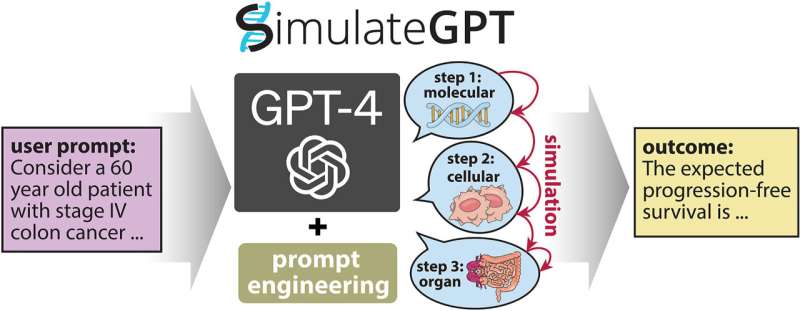This article has been reviewed according to Science X's editorial process and policies. Editors have highlighted the following attributes while ensuring the content's credibility:
fact-checked
trusted source
proofread
Researchers develop GPT-4-based simulator for biomedical research

The artificial intelligence (AI) model GPT-4, known from its application in ChatGPT, shows impressive capabilities in biomedical research and can be used in many ways for simulations. A simulator developed at MedUni Vienna and based on GPT-4 shows increased accuracy in classifying the importance of genes in cancer cells, as well as in the prognosis of cancer patients.
The results of the study were published in the journal Computers in Biology and Medicine.
Large language models such as GPT-4 have proven to be extremely useful in various fields, including biomedicine. A research team from MedUni Vienna's Institute of Artificial Intelligence and the CeMM Research Center for Molecular Medicine, led by Matthias Samwald and Christoph Bock, has shown that a large language model such as GPT-4 can be used effectively as a simulator for biological systems.
The study tests the hypothesis that the stepwise simulation of biological and medical processes with GPT-4 leads to better results. This is relevant for future application in biomedical research as well as for the understanding of these new models.
Computer simulations of biological processes are an important tool for biomedical research, but usually require a lot of expertise and manual adjustments. The research team has developed "SimulateGPT," a knowledge-based simulation method through structured inputs in GPT-4.
This method has been tested and validated by experts in various scenarios such as mouse experiments, sepsis treatment support, prediction of essential genes in cancer cells and progression-free survival of cancer patients. The method is designed for basic research and is not intended for clinical use.
Structured inputs and targeted instructions
Language models such as GPT-4 are driven by text input, so-called "prompts," to perform specific tasks or solve problems. Modern models such as ChatGPT/GPT-4 respond directly to simple questions, but have difficulty solving more complex scenarios that are common in biomedicine.
In the study, the scientists configured GPT-4 with structured inputs and targeted instructions so that it simulated given scenarios in detail with text. The study showed that this GPT-4-based simulator achieved significantly better results.
The study's experiments demonstrated that biomedical experts preferred SimulateGPT's predictions over direct GPT-4 responses. In addition, SimulateGPT improved accuracy in both determining essential genes in cancer cells and predicting progression-free survival of cancer patients compared to traditional GPT-4 responses.
"This study shows that large language models (LLMs) such as GPT-4 could enable a new class of biomedical simulators," explains Matthias Samwald. "Text-based simulations are particularly suitable for modeling and understanding living systems, as text and language provide the flexibility and interpretability needed to describe the complexity of biology.
"For the further development of LLM-based biomedical simulators, we propose several directions, including the integration of biological databases and mathematical modeling, as well as the training of new AI models with experimental data."
More information: Moritz Schaefer et al, GPT-4 as a biomedical simulator, Computers in Biology and Medicine (2024). DOI: 10.1016/j.compbiomed.2024.108796





















